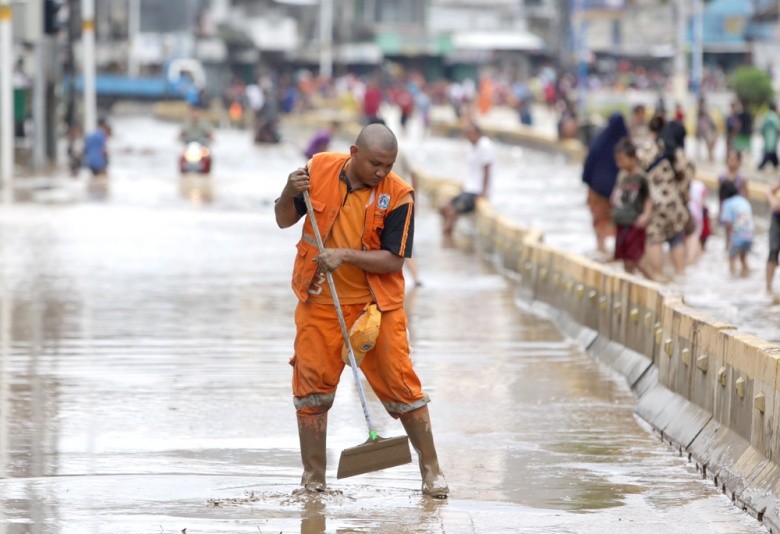Popular Reads
Top Results
Can't find what you're looking for?
View all search resultsPopular Reads
Top Results
Can't find what you're looking for?
View all search resultsEmbrace new normal
Beyond seeking who to blame, it is critical for the government and local administrations to prepare comprehensive flood-control projects for the three provinces, which share river estuaries.
Change text size
Gift Premium Articles
to Anyone
We were all caught off guard by the recent widespread flooding in Jakarta and not only because we have ignored scientists.
The dry season remained intense in Indonesia’s south until December, with many areas experiencing hundreds of days without rain. The central government and local administrations were struggling to distribute clean water to East Sumba and many southern islets when suddenly nature altered its course to the other extreme.
Within days, the rain began to pour. The Meteorology, Climatology and Geophysics Agency (BMKG) had warned that heavy rain would peak in February. But no one was really prepared for the rapid change in such a short period, let alone able to act fast enough to anticipate the worst.
Scientists warn climate change has taken its toll on weather patterns, meaning not only longer periods of rain or drought but also greater intensity of both weather phenomena. The BMKG recorded that the dry season last year was the most severe since 2015, leading to forest fires and drought in many regions. Experts say the New Year’s floods and landslides in Jakarta, West Java and Banten are the result of extreme rainfall in several areas. The rainfall intensity at Halim Perdanakusuma Air Force Base in East Jakarta on New Year’s Eve was recorded at 377 millimeters per day, the highest in the city’s history.
Beyond seeking who to blame, it is critical for the government and local administrations to prepare comprehensive flood-control projects for the three provinces, which share river estuaries.
The central government and the local administrations may claim that dam projects and other flood-prevention programs are under way, but the floods and landslides that hit the three provinces, killing at least 60 and displacing more than 170,000, have proven that the projects are not sufficient.
The government needs sound engineering using the latest technology to be able to prevent massive floods and landslides caused by extreme rains. Indonesia is not the only country in the world to experience extreme weather. Other countries have also experienced extreme weather and have embraced it relatively well.
Japan has built the Metropolitan Area Outer Underground Discharge Channel, a massive underground floodwater drainage system to protect Tokyo from floods. The water tank — at 177 meters in length, 78 m in width and 25 m in depth — was completed in 2006. It complements the other dams, levees and reservoirs that comprise the flood control system.
With almost a third of its area located below sea level, the Netherlands has been known for its cutting edge technology in flood defense, with computerized and integrated dikes, levees and other facilities to hold back sea water.
The problem with Indonesia’s current flood-control programs is that they are boxed off for every region and built as a local response, instead of one grand, effective design.
Thinking small in flood prevention will not mitigate the water catastrophe. The time wasted on the blame game not only reflects the incompetence of the respective administrations, but also ignores the many lives lost in the disasters.










